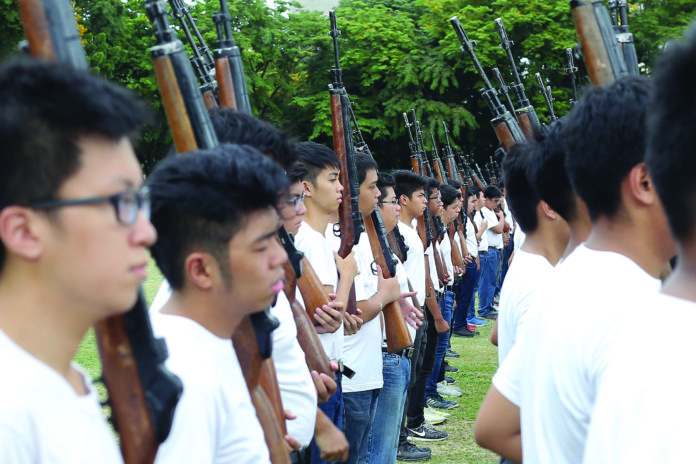THE DEPARTMENT of National Defense (DND) has called for the implementation of a mandatory Reserve Officer Training Corps (ROTC) program, saying it instills nationalistic values among college students.
DND seeks to make the program a compulsory college requirement anew, heeding President Duterte’s call to strengthen the ROTC program in his State of the Nation Address last July.
“We are taking our cue from the President himself. He believes that it is a good vehicle to instill love of country and patriotism and also it will instill a sense of good citizenship in our youth,” DND Public Affairs Office Director Arsenio Andolong said in an interview with the Varsitarian.
Col. Roland Rodil of the Armed Forces Retirees and Reservist Affairs Office said Duterte saw the ROTC program as vital in developing discipline.
“It is the government’s duty to develop the youth, to develop discipline, to build their character,” Rodil said.
Rodil added that higher education institutions should not oppose mandatory ROTC and should instead work with the proponents of the program to improve it.
“In case it becomes a law, they should not be first ones to protest against it. [They] are partners of the government in educating the youth. [But] if they have any objections, they should raise it right now,” Rodil said.
ROTC was made mandatory by the National Defense Act of 1935, but this law was amended by Republic Act 9163 or the National Service Training Program (NSTP) Act of 2001, which provided students more options such as Civic Welfare Training Service (CWTS) and Literacy Training Service (LTS).
‘Abuses and corruption’
Akbayan Youth Chairwoman Rafaela David claimed the problems in the reserve program were tethered to the ROTC program itself, describing it as “militarizing” universities.
“It is basically militarizing universities and that is precisely what we are against. It is not just the abuses, it is the system that promotes militarization in the campuses na gusto mong pigilan. Naniniwala tayo na ang unibersidad ay dapat espasyo para may kalayaan ang mga estudyante at hindi dapat ito espasyo kung saan kinukulong sila at kumbaga they are forced to fit a certain mold—the mold of a cadet officer,” David told the Varsitarian.
David said mandating military training would impede academic freedom as students would have no choice but to take up ROTC.
“If you make it mandatory that already stunts their capacity to choose. In the existing system, at least they have the choice to enroll in ROTC, CWTS or LTS, but mandate ROTC and they won’t have the option to serve the country in other means,” David said.
Thomasian Mark Welson Chua, a former ROTC cadet, was murdered in 2001 for exposing anomalies in the ROTC unit in the University through the Varsitarian.
David said the reforms brought about by Mark Welson Chua’s death was a legacy of “democratization of universities.”
“If you suddenly bring the ROTC back, it is as if you are disregarding the victory of the past and that is also a disservice to the memory of Mark Chua,” David said.
The mandatory ROTC program was abolished in January 2002, a year after Mark Chua’s death in 2001.
International Humanitarian Law
Kabataan Partylist Rep. Sarah Elago said establishing reservist training grounds in educational institutions like UST would violate International Humanitarian Law.
She said international humanitarian law states that “the civilian population and individual civilians shall enjoy general protection against the dangers arising from military operations.”
Elago has filed House Bill 2399, or the ROTC Abolition Act, which aims to scrap ROTC from the options of National Service Training courses and at the same time overhaul the NSTP program by adding other courses.
These options include community service, community-based health and nutrition program, community immersion, disaster preparedness, ecological services and human rights education.
‘ROTC can do what NSTP can do’
Supporters of the mandatory ROTC program argued that NSTP were merely parts of the reserve program, adding that civic welfare and literacy training could also be done by reserve cadets.
“We can easily duplicate the activities of civic welfare. The AFP or even the army, we are configured to do civic activities,” Col. Edgar Nigos of the UST Department of Military Science and Tactics said in an interview.
“We do humanitarian activities, disaster rehabilitation, relief, and during elections we are deputized to work with officials.
The military itself is configured to do non-military activities. In the same manner, ROTC is not solely drills and marching and parades,” he said.


















